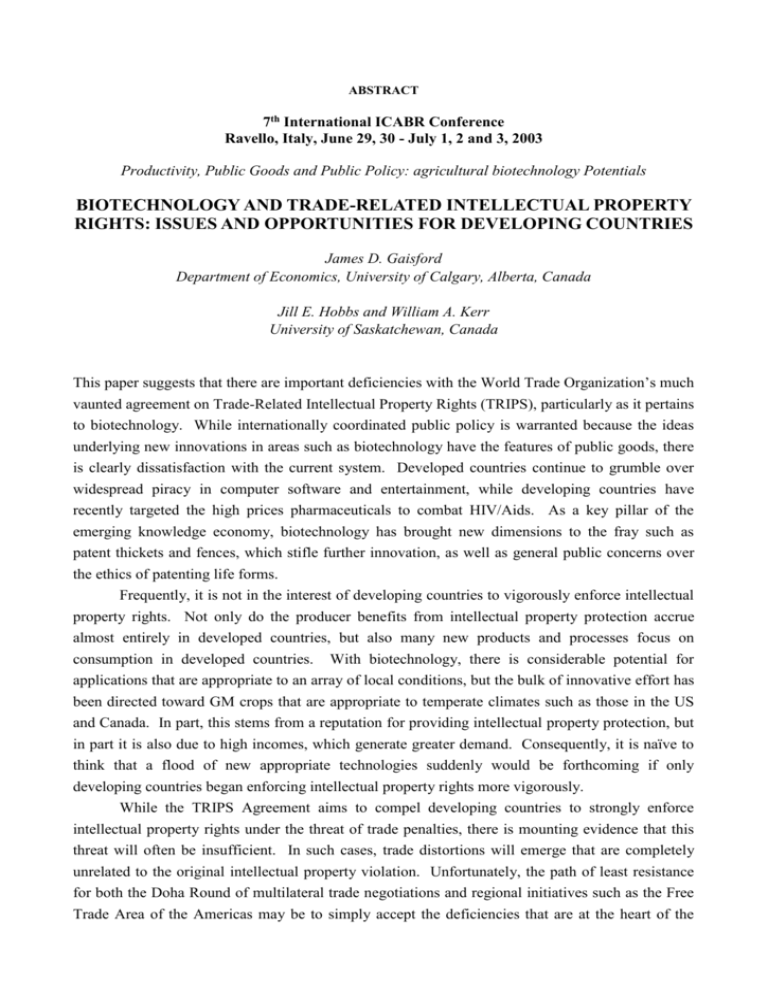biotechnology and trade-related intellectual property rights: issues
advertisement

ABSTRACT 7th International ICABR Conference Ravello, Italy, June 29, 30 - July 1, 2 and 3, 2003 Productivity, Public Goods and Public Policy: agricultural biotechnology Potentials BIOTECHNOLOGY AND TRADE-RELATED INTELLECTUAL PROPERTY RIGHTS: ISSUES AND OPPORTUNITIES FOR DEVELOPING COUNTRIES James D. Gaisford Department of Economics, University of Calgary, Alberta, Canada Jill E. Hobbs and William A. Kerr University of Saskatchewan, Canada This paper suggests that there are important deficiencies with the World Trade Organization’s much vaunted agreement on Trade-Related Intellectual Property Rights (TRIPS), particularly as it pertains to biotechnology. While internationally coordinated public policy is warranted because the ideas underlying new innovations in areas such as biotechnology have the features of public goods, there is clearly dissatisfaction with the current system. Developed countries continue to grumble over widespread piracy in computer software and entertainment, while developing countries have recently targeted the high prices pharmaceuticals to combat HIV/Aids. As a key pillar of the emerging knowledge economy, biotechnology has brought new dimensions to the fray such as patent thickets and fences, which stifle further innovation, as well as general public concerns over the ethics of patenting life forms. Frequently, it is not in the interest of developing countries to vigorously enforce intellectual property rights. Not only do the producer benefits from intellectual property protection accrue almost entirely in developed countries, but also many new products and processes focus on consumption in developed countries. With biotechnology, there is considerable potential for applications that are appropriate to an array of local conditions, but the bulk of innovative effort has been directed toward GM crops that are appropriate to temperate climates such as those in the US and Canada. In part, this stems from a reputation for providing intellectual property protection, but in part it is also due to high incomes, which generate greater demand. Consequently, it is naïve to think that a flood of new appropriate technologies suddenly would be forthcoming if only developing countries began enforcing intellectual property rights more vigorously. While the TRIPS Agreement aims to compel developing countries to strongly enforce intellectual property rights under the threat of trade penalties, there is mounting evidence that this threat will often be insufficient. In such cases, trade distortions will emerge that are completely unrelated to the original intellectual property violation. Unfortunately, the path of least resistance for both the Doha Round of multilateral trade negotiations and regional initiatives such as the Free Trade Area of the Americas may be to simply accept the deficiencies that are at the heart of the existing TRIPS Agreement. Developed countries will then continue to pretend that new biotech innovations are going to be created that are beneficial to developing countries, and the latter countries will pretend that they are going to rigorously enforce intellectual property rights. To get beyond this low-level equilibrium, the paper will argue that it is necessary to redress the international distribution of costs and benefits of intellectual property protection. As the efficacy of the TRIPS stick seems in doubt, it would seem useful to explore carrot-based strategies involving trade concessions and cooperation to promote capacity building in intellectual property in developing countries. Until protecting intellectual property in biotechnology is in the interests of developing countries, the profitability of investing in biotechnology will be reduced and the full potential of the technology for both developed and developing countries will not be realized.







